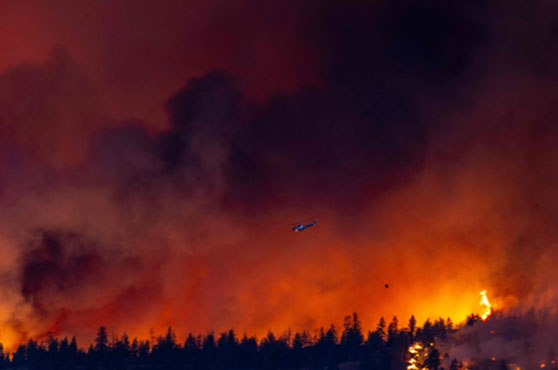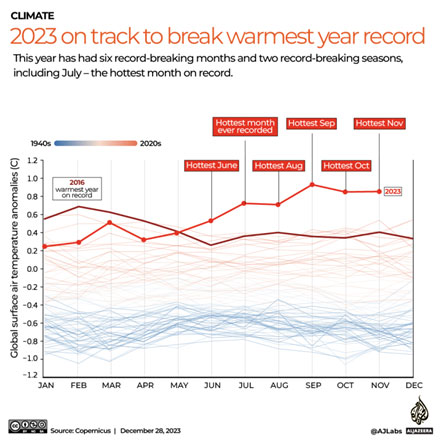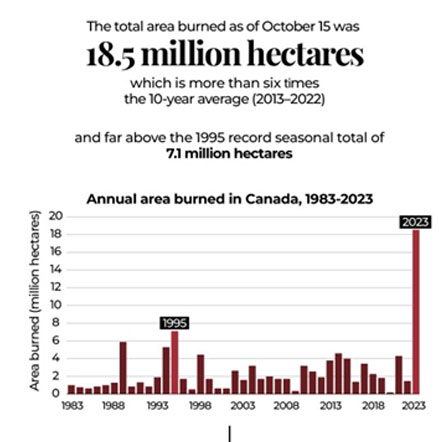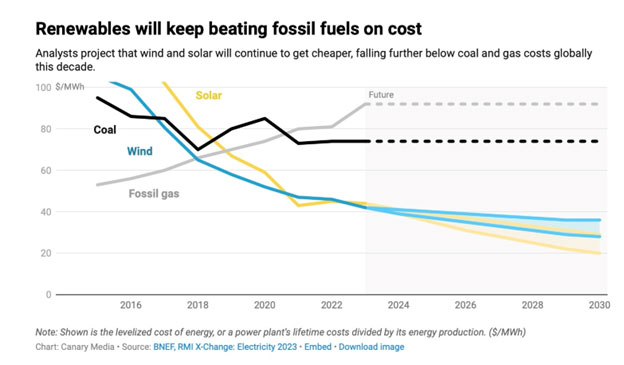A helicopter battles the McDougall Creek wildfire as it burns in the hills of West Kelowna, British Columbia, on Aug. 17. (Darren Hull/AFP/Getty Images)
Will 2023 be the year that was or merely a prelude of the years to come?
It is likely that 2023 will be remembered as the point at which humanity’s inability to deal with a climate crisis of its own making the was finally and fully exposed. Will 2023 be also remembered as an inflection upon which the science is truly accepted by society thereby driving radical and rapid change? Or will the heat anomaly and catastrophes of 2023 be looked back upon as one of the cooler, more stable years in people’s lives.
2023 WAS A YEAR OF EXTREMES
This past year has now been confirmed as the hottest year in recorded history – a record surpassed by a large margin and much sooner than predicted. Scientists repeatedly expressed shock as successive heat records fell, and warned the world is moving dangerously close to the 1.5-degree limit that nearly 200 countries sought to avoid in the Paris Agreement in 2015.
Deaths from heat stroke are at an all-time high around the world. Millions around the globe are now stranded in inhospitable conditions by global heating. The graph shows some of the many records broken – these from the global measurements just prior to the year end. There were countless local records also surpassed.
In addition to global atmospheric temperatures – many other records were were smashed in 2023 including:
- levels of heat absorbed by Earth’s oceans, which have been warming year-on-year for the past decade
- loss of sea ice in the Arctic and Antarctic,
- extent and duration of ‘heat domes’ (such as in Phoenix Arizona with over 30 days above 43 degrees C / or 110 F),
- extent of rainfall (especially in China) and flooding (with the flood in eastern Libya considered the worst disaster of the 21st century)
- extent and duration of droughts with associated food insecurity,
- total hectares lost from wildfires (especially in Canada – see chart).
2023 WAS ALSO A YEAR FOR SOME HOPE
The climate extremes of 2023 were impossible to ignore thus raising overall awareness about the extent of the climate emergency. There were some positive signs of movement in the right direction.
- The COP 28 (Conference of the Parties) at least mentioned the ‘elephant in the room’ – that being fossil fuels. The final compromise agreement stated the need to transition “away from fossil fuels in energy systems in a just, orderly and equitable manner, accelerating action in this critical decade, so as to achieve net zero by 2050 in keeping with the science”. It was considered a victory of sorts given the fact that this is the first COP where the words ‘fossil fuels’ are actually included in the draft decision. More about this below.
- Over the year, global renewable energy capacity grew by the fastest pace ever recorded, which could put the world within reach of meeting a key climate target by the end of the decade, according to the International Energy Agency. Moreover, the cost of renewables is improving significantly – see chart.
- Policy initiatives in many countries (USA, Canada, much of Europe and even China) are driving the increased uptake of electric vehicles and the building of energy efficient buildings.
- Governments, fossil fuel firms and airlines are increasingly being met with climate lawsuits. According to data bases run by the Columbia University’s Sabin Center for Climate Change Law, there are more than 2,500 lawsuits recorded globally, and this shows no sign of stopping any time soon. Why? – because it is highly effective.
LOOKING AHEAD TO 2024
According to most predictions, 2024 will be as hot or hotter than 2023. Vast areas of Earth’s oceans were record-warm for most of 2023, and it will take many months for that heat to be released. Moreover, an intense episode of the planet-warming El Niño climate pattern is nearing its peak, and the last time that happened, it pushed the planet to record warmth (in 2016).
It is also likely that the momentum that has been building towards the transition away from fossil fuels, will continue. Afterall, the awareness about the climate emergency within the public is higher than it has ever been. Any kind of denial about the reality climate change has been burned to a crisp.
As well, many scientists are increasingly optimistic about the power of technology to change the world, and in terms of our fight against climate change it’s one of the strongest levers that we have.
Massive forms of activism though, would be an even stronger lever. Political will depends on the mood of voters. What worries me is the trend towards extreme right-wing politics along with disinformation tactics that can easily work towards pushing the stop button on progress and even take us backwards. As I wrote in a previous article, capital has an outsized influence on politics thus sowing decades of division while the situation has worsened. In fact – Capital is rewarded by governments around the world, with subsidies estimated by the World Bank to be 23 million dollars per minute.
Indeed, capital (or big money) had an outsized influence on the last COP conference with oil industry lobbyists outnumbering the delegates of many developed countries – hence a weakened commitment. Many from the science community feel that the text included language to placate fossil fuel interests and thus fell far short of what was needed on emissions reductions and finance to help the most vulnerable cope with worsening extreme weather and heat. The statement should, as a minimum, have stated the need to “phase out” of instead of “a transition away” from fossil fuels. In instances like these – words do matter.
Where does all this leave us? My conclusion is the same as for my last article. Short of donating to environmental organizations, or initiating our own forms of advocacy, the most important action we can individually do is to vote for our future and convince others to do the same. Politics matter – especially this year with so many critical elections taking place. Any politician that does not acknowledge the crises the planet is facing and endorse a legitimate set of plans to deal with climate change and planetary destruction is not fit for office. We all have the power to ensure this happens and to advocate for change.
NOTE




